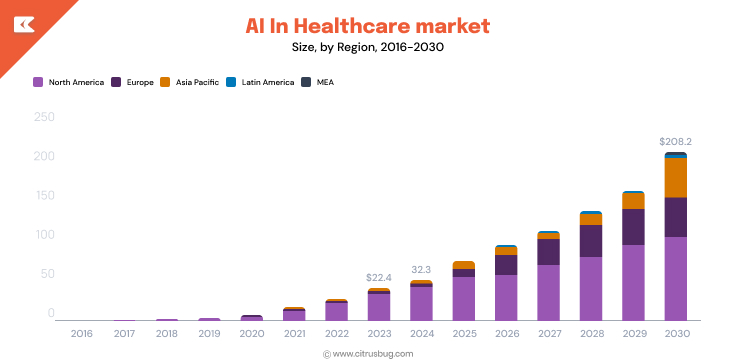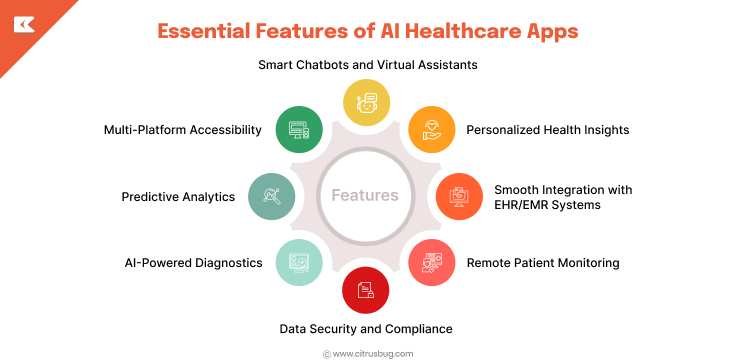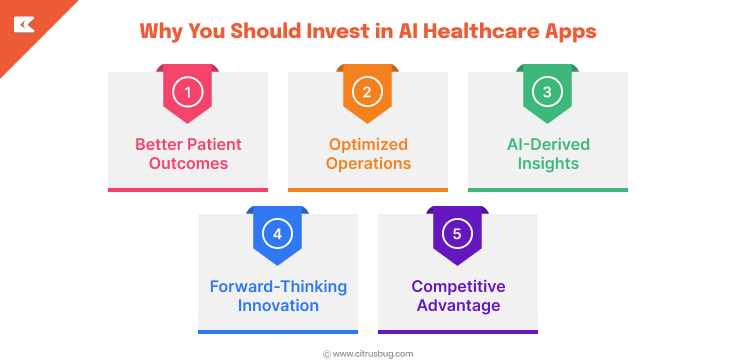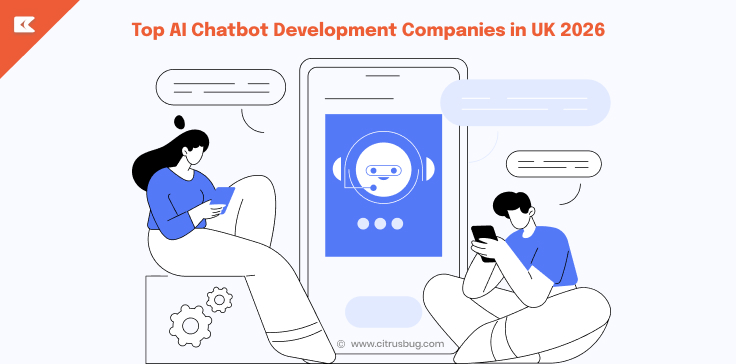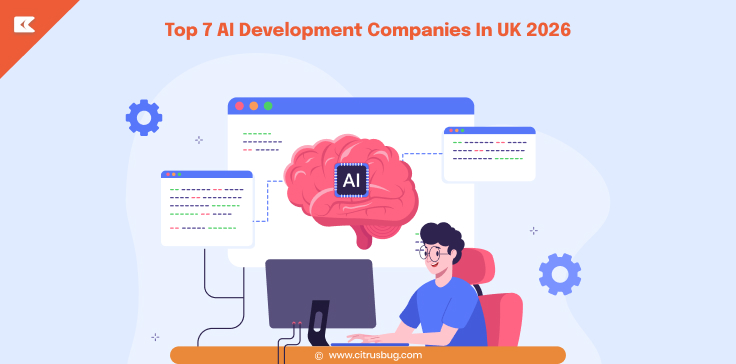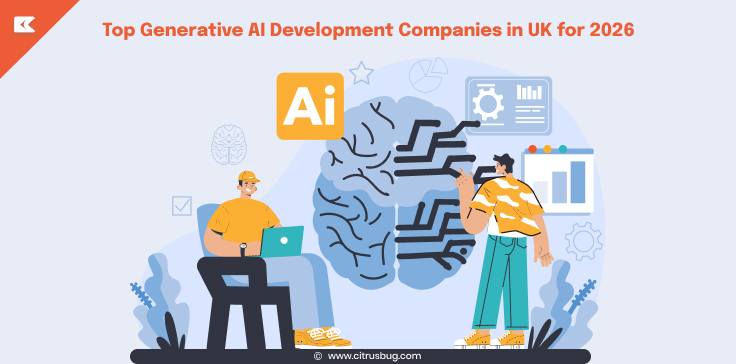Table of Contents
- Market Overview of AI Healthcare Apps
- Why AI Healthcare Apps Are Gaining Popularity
- Essential Features of AI Healthcare Apps
- Key Factors That Affect the Cost of Developing an AI Healthcare App
- Average Cost Range to Develop an AI Healthcare App
- Hidden Costs You Shouldn’t Overlook
- Why You Should Invest in AI Healthcare Apps
- How to Reduce the Cost of Developing an AI Healthcare App
- Future of AI Healthcare Apps
- Conclusion
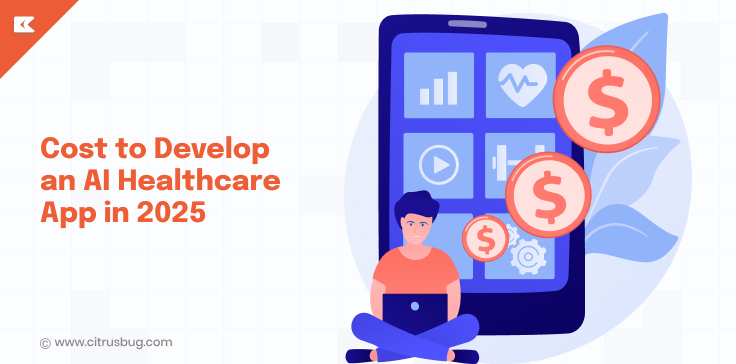
Artificial intelligence has become one of the most transformational trends in healthcare. By minimizing diagnosis mistakes to facilitating real-time patient monitoring, AI healthcare apps are no longer an idea of the distant future; they are operational tools that are transforming clinical practice. The most critical question to ask startups, hospitals, and digital health innovators is What does it cost to build AI-based healthcare applications?
In this guide, we will discuss the market trends, essential features, pricing drivers, actual pricing, and why healthcare companies need to consider investing in AI apps.
Market Overview of AI Healthcare Apps
The market of AI apps in healthcare is developing exponentially. Grand View Research has forecast the AI healthcare sector to grow at a CAGR of 37.5 % between 2024-2030 to USD 22.45 billion by 2023. This makes AI one of the growing technologies in healthcare.
This jump can mainly be explained by the growing popularity of digital health solutions and the handling of the medical data explosion. Hospitals and startups are adopting AI-based applications in healthcare to analyze medical images, predictive healthcare, and enhanced patient journeys. Regulatory approvals are increasingly becoming widespread and thus adoption is only growing.
For organizations, this trend signals a clear opportunity. Backed by strong AI development statistics and investor confidence, AI healthcare apps are proving essential in reducing costs, improving care delivery, and unlocking new business models.
Why AI Healthcare Apps Are Gaining Popularity
Demand for AI healthcare apps is increasing as patients and providers look for more intelligent, data-driven therapies. Diagnosis and engagement are being complemented and expanded by these apps, they’re helping to redefine digital healthcare.
Improved Diagnostic Accuracy
Healthcare AI apps assist doctors with the proper determination of medical images, laboratory data and patient records. This will reduce errors and ensure early disease detection, which inevitably improves patient outcomes.
Personalized Treatment Plans
The potential of AI apps in healthcare includes even indicating individual treatment plans, taking advantage of predictive analytics and the data of patients. This enables patients to have a personalized treatment that involves their medical history and lifestyle.
Operational Efficiency for Providers
By automating administrative work to better allocate resources, AI-led tools give medical professionals the time they need to concentrate on patient attention. Hospitals can reduce costs and achieve greater efficiency.
Improved Patient Safety
Artificial intelligence-driven healthcare applications offer patients chatbots, symptom checkers, and reminders. These are directed to improve active involvement on their part with regard to their health and as well as compliance with drugs.
Scalability and Cost Reduction
As medical systems become burdened, AI proves helpful in relieving the burden by completing repetitive duties. This streamlines workflows, makes them affordable, and has the potential to preserve the quality of care.
Support for Preventive Healthcare
Use cases of AI in healthcare are not limited to treatment. As an example, mobile applications can warn patients about possible medical issues before posing any serious threat. This active strategy assists in preventive treatment and saves money in the long run.
Essential Features of AI Healthcare Apps
Creating an effective AI healthcare application takes more than cutting-edge algorithms. To increase the company value, these apps should have functions that will increase the user friendliness, safety and clinical outcomes.
Smart Chatbots and Virtual Assistants
The integrated AI chatbots can offer 24-hour support in terms of symptom checking, appointment booking, and medication reminders. This increases patient contact at the same time, decreasing the workload of the healthcare professionals.
Personalized Health Insights
Through examination of user information, AI applications are able to provide personalized recommendations and treatment guidance. Customized care not only improves results but also enhances patient confidence in digital platforms.
Smooth Integration with EHR/EMR Systems
For optimal performance, AI healthcare apps must interface seamlessly with current hospital systems. This enables centralized access to patient records, minimizing duplication and errors.
Remote Patient Monitoring
Services such as the ability to integrate wearable devices and provision of real-time health tracking enable providers to track patients beyond the clinical facility, which serves preventative and ongoing care.
Data Security and Compliance
It is crucial to comply with HIPAA, GDPR, among other healthcare laws. Some of the security mechanisms that protect sensitive patient data and information involve encryption and role-based access to ensure that information is not easily retrieved by a third party in the form of a data breach.
AI-Powered Diagnostics
Advanced algorithms have the potential to analyze medical pictures, lab results, and genetic data to assist the physician in diagnosis faster and more accurately. This minimizes the chance of misdiagnosis.
Predictive Analytics
AI can help to identify health risks in their earliest stages and prevent them with risk prediction, powering preventive health care programs.
Multi-Platform Accessibility
The application must be easily accessible on mobile, on desktop, and even on wearable devices. This will make patient interaction higher and provider time efficient.
Key Factors That Affect the Cost of Developing an AI Healthcare App
The cost of developing an AI-powered healthcare application is different and depends on the design of the app, complex AI-focused features and integration. Knowing these cost drivers would ensure that you have an evaluation with a realistic budget, and it would not come as a surprise and pull you.
Complexity of App and Features
A basic application that includes such features as an appointment booking system and sending reminders would not be as costly as a more advanced, involving AI-based diagnostics, predictive analytics, or remote patient monitoring service.
UI/UX Design Quality
A better-designed and intuitive user interface enhances user friendliness, but needs more wireframes, prototyping and testing investment. Healthcare settings require good design to be adopted.
AI Model Development and Training
The complexity of the AI algorithms, the amount of training data, and the necessity of continuous updates have a huge impact on the budget. The machine-learning model of image recognition or natural-language processing is resource-intensive.
Integration with Healthcare Systems
Integrating the app to EHR/EMRs or to third-party healthcare tools increases development time and cost, but is required for real-world clinical use.
Data Security and Compliance
To comply with HIPAA, GDPR and FDA/IEC 62304, robust encryption, audit trails, and access control are essential, which add to development costs, but guarantee trust and compliance.
Technology Stack and Infrastructure
The backend framework, cloud service, and AI framework used can alter the initial and the overall cost, particularly when scalability is valued.
Team Expertise and Location
The costs of development will be different based on whether you use local developers or outsource to experienced ones. In the case you hire AI engineers, the level of skills will directly contribute to the end budget.
Average Cost Range to Develop an AI Healthcare App
Developing an AI healthcare app is more than just coding an interface. It requires thoughtful design, secure architecture, regulatory compliance, and advanced AI features. Each component adds unique value and contributes differently to the overall development cost.
| Component | Estimated Cost Range (USD) | Component Details |
|---|---|---|
| UI/UX Design | $8,000 – $15,000 | Wireframing, prototyping, and creating intuitive, patient-friendly interfaces. |
| Frontend Development | $12,000 – $20,000 | Building the mobile/web interface that users interact with, ensuring responsiveness and accessibility. |
| Backend Development | $15,000 – $25,000 | Server-side logic, APIs, and secure databases to manage healthcare data. |
| AI/ML Model Development | $25,000 – $60,000 | Designing, training, and deploying models for predictive analytics, medical imaging, or chatbot features. |
| Integration with Healthcare Systems | $10,000 – $20,000 | Connecting the app with EHR/EMR platforms, medical devices, and ensuring compliance. |
| Security & Compliance | $8,000 – $15,000 | Implementing HIPAA, GDPR, and FDA/IEC 62304 standards with encryption and access control. |
| Testing & Maintenance | $12,000 – $20,000 | QA testing, performance optimization, bug fixes, and post-launch support. |
Hidden Costs You Shouldn’t Overlook
Most decision-makers pay attention to directly observable development expenses when drafting the budget of an AI healthcare app. But various hidden costs are likely to come up after deployment and during. Taking them into consideration earlier would give a more realistic financial plan.
1. AI Model Training and Retraining for Accuracy
AI apps in healthcare require continuous model improvements. Retraining with fresh datasets ensures predictions remain accurate, but this process demands expert engineers and additional computing resources.
2. Continuous Compliance Audits
Laws such as the HIPAA, GDPR, and FDA keep changing often. Frequent compliance, certification, and auditing are essential in maintaining AI healthcare apps compliant and credible towards the law.
3. Cloud Storage and Infrastructure Scaling
There are additional costs incurred in storing sensitive medical data and scaling the infrastructure to accommodate more users. With the increased adoption, more sophisticated cloud solutions are necessary to support the performance and security.
4. Long-Term App Maintenance and Updates
A healthcare AI app is not ready-to-go at launch. The feature upgrade, periods of updates, and bug fixing make sure that the application still remains valuable, satisfying the changing needs of healthcare.
Considering these unseen costs in this AI software development process will enable organizations to avoid surprises and create a sustainable solution that won’t fade quickly.
Why You Should Invest in AI Healthcare Apps
- Better patient outcomes – AI apps in healthcare can help providers determine diseases earlier and provide treatment recommendations based on patient data, and can remove human error and increase the quality of care given.
- Optimized operations -The daily activities that include repetitive tasks, appointment scheduling and maintenance of records are automated, saving time and cutting administrative costs on the part of the staff.
- AI-derived insights – AI-derived insights are more likely to guide clinical and business decisions, based on knowledge and understanding of trends and patterns in large volumes of medical data.
- Forward-thinking innovation – By deploying Generative AI within the business world, healthcare organisations can access entirely new ways of engaging with their patients and developing digital ecosystems that can be scaled.
- Competitive advantage – AI healthcare apps can drive more patients, investors, and partnerships, putting the healthcare providers and businesses at the forefront of digital transformation.
How to Reduce the Cost of Developing an AI Healthcare App
The process of creating an AI healthcare app may be quite expensive, but there are options to streamline the expenses without making any sacrifices to quality or compliance:
Prioritize core features first
Start with an MVP (Minimum Viable Product) that will have only core functions such as patient management, AI-assisted diagnostics, or telemedicine. The method will save on upfront expenses and will allow improvement depending on user comments.
Use pre-trained AI models where possible
Rather than designing all AI functionalities, reuse the prior creativity when learning to recognize images or use NLP. This reduces the development cost, time and does not compromise high accuracy.
Adopt cloud-based infrastructure
Clouds are services where you can have storage and processing power that is scalable without having to deploy a lot of hardware in advance. They can lower maintenance costs in the long run and are also flexible enough to meet future expansions.
Outsource to specialized teams
Collaboration with a well-established healthcare app development agency provides you with access to skilled developers, compliance experts, and AI engineers, thus cutting trial and error costs and accelerating delivery.
Plan for long-term maintenance
Early warnings, regular upgrades and Compliance checks prevent expensive fixes later. Investing in continuous support sums up big resources over a long time.
Future of AI Healthcare Apps
The future of AI healthcare apps is bright and promising since technology continues to transform the way patients are taken care of. As new healthcare software trends develop, including predictive analytics, personalized medicine, and advanced diagnostics, these applications will find even more widespread application in healthcare systems to enhance performance, accuracy, and access to providers and patients.
As AI continues to develop, medical applications will probably follow and connect with wearable devices, distance monitoring, and IoT equipment to make real-time information accessible. This transition will not only have the effect of improving clinical decision-making but also allow patients to become active with regard to their health.
Conclusion
The cost of creating an AI medical application will be influenced by scope, functionality, regulations, and development talent. Basic apps would start at around $40,000, but solutions of enterprise level might go well over $200,000.
At Citrusbug Technolabs, we excel in creating secure, compliant and scalable healthcare app development solutions that are customized to suit your needs. It could be an AI-powered chatbot, diagnostic or predictive analytics tool; our team will ensure your product addresses real-world clinical standards.





 SaaS Development
SaaS Development Web Application Development
Web Application Development Mobile Application Development
Mobile Application Development Custom Software Development
Custom Software Development Cloud Development
Cloud Development DevOps Development
DevOps Development MVP Development
MVP Development Digital Product Development
Digital Product Development Hire Chatbot Developers
Hire Chatbot Developers Hire Python Developers
Hire Python Developers Hire Django Developers
Hire Django Developers Hire ReactJS Developers
Hire ReactJS Developers Hire AngularJS Developers
Hire AngularJS Developers Hire VueJS Developers
Hire VueJS Developers Hire Full Stack Developers
Hire Full Stack Developers Hire Back End Developers
Hire Back End Developers Hire Front End Developers
Hire Front End Developers AI Healthcare Software Development & Consulting
AI Healthcare Software Development & Consulting Healthcare App Development
Healthcare App Development EHR Software Development
EHR Software Development Healthcare AI Chatbot Development
Healthcare AI Chatbot Development Telemedicine App Development Company
Telemedicine App Development Company Medical Billing Software Development
Medical Billing Software Development Fitness App Development
Fitness App Development RPM Software Development
RPM Software Development Medicine Delivery App Development
Medicine Delivery App Development Medical Device Software Development
Medical Device Software Development Patient Engagement Software Solutions
Patient Engagement Software Solutions Mental Health App Development
Mental Health App Development Healthcare IT Consulting
Healthcare IT Consulting Healthcare CRM Software Development
Healthcare CRM Software Development Healthcare IT Managed Services
Healthcare IT Managed Services Healthcare Software Testing services
Healthcare Software Testing services Medical Practice Management Software
Medical Practice Management Software Outsourcing Healthcare IT Services
Outsourcing Healthcare IT Services IoT Solutions for Healthcare
IoT Solutions for Healthcare Medical Image Analysis Software Development Services
Medical Image Analysis Software Development Services Lending Software Development Services
Lending Software Development Services Payment Gateway Software Development
Payment Gateway Software Development Accounting Software Development
Accounting Software Development AI-Driven Banking App Development
AI-Driven Banking App Development Insurance Software Development
Insurance Software Development Finance Software Development
Finance Software Development Loan Management Software Development
Loan Management Software Development Decentralized Finance Development Services
Decentralized Finance Development Services eWallet App Development
eWallet App Development Payment App Development
Payment App Development Money Transfer App Development
Money Transfer App Development Mortgage Software Development
Mortgage Software Development Insurance Fraud Detection Software Development
Insurance Fraud Detection Software Development Wealth Management Software Development
Wealth Management Software Development Cryptocurrency Exchange Platform Development
Cryptocurrency Exchange Platform Development Neobank App Development
Neobank App Development Stock Trading App Development
Stock Trading App Development AML software Development
AML software Development Web3 Wallet Development
Web3 Wallet Development Robo-Advisor App Development
Robo-Advisor App Development Supply Chain Management Software Development
Supply Chain Management Software Development Fleet Management Software Development
Fleet Management Software Development Warehouse Management Software Development
Warehouse Management Software Development LMS Development
LMS Development Education App Development
Education App Development Inventory Management Software Development
Inventory Management Software Development Property Management Software Development
Property Management Software Development Real Estate CRM Software Development
Real Estate CRM Software Development Real Estate Document Management Software
Real Estate Document Management Software Construction App Development
Construction App Development Construction ERP Software Development
Construction ERP Software Development





